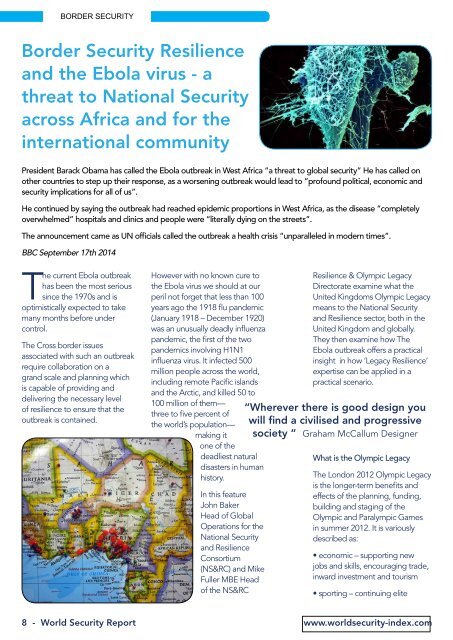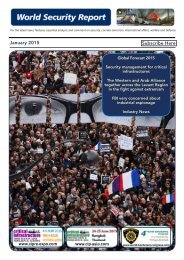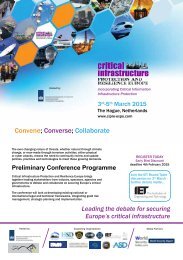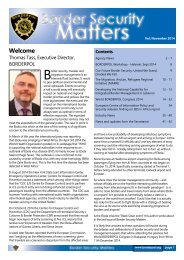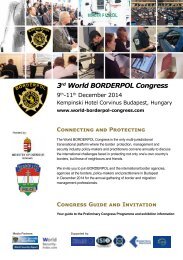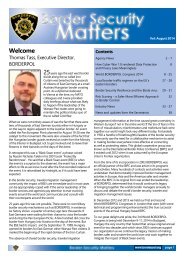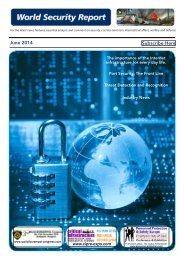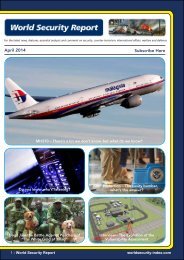September 2014 Subscribe Here
World Security Report September 2014
World Security Report September 2014
You also want an ePaper? Increase the reach of your titles
YUMPU automatically turns print PDFs into web optimized ePapers that Google loves.
BORDER SECURITY<br />
Border Security Resilience<br />
and the Ebola virus - a<br />
threat to National Security<br />
across Africa and for the<br />
international community<br />
President Barack Obama has called the Ebola outbreak in West Africa “a threat to global security” He has called on<br />
other countries to step up their response, as a worsening outbreak would lead to “profound political, economic and<br />
security implications for all of us”.<br />
He continued by saying the outbreak had reached epidemic proportions in West Africa, as the disease “completely<br />
overwhelmed” hospitals and clinics and people were “literally dying on the streets”.<br />
The announcement came as UN officials called the outbreak a health crisis “unparalleled in modern times”.<br />
BBC <strong>September</strong> 17th <strong>2014</strong><br />
The current Ebola outbreak<br />
has been the most serious<br />
since the 1970s and is<br />
optimistically expected to take<br />
many months before under<br />
control.<br />
The Cross border issues<br />
associated with such an outbreak<br />
require collaboration on a<br />
grand scale and planning which<br />
is capable of providing and<br />
delivering the necessary level<br />
of resilience to ensure that the<br />
outbreak is contained.<br />
However with no known cure to<br />
the Ebola virus we should at our<br />
peril not forget that less than 100<br />
years ago the 1918 flu pandemic<br />
(January 1918 – December 1920)<br />
was an unusually deadly influenza<br />
pandemic, the first of the two<br />
pandemics involving H1N1<br />
influenza virus. It infected 500<br />
million people across the world,<br />
including remote Pacific islands<br />
and the Arctic, and killed 50 to<br />
100 million of them—<br />
three to five percent of<br />
the world’s population—<br />
making it<br />
one of the<br />
deadliest natural<br />
disasters in human<br />
history.<br />
In this feature<br />
John Baker<br />
Head of Global<br />
Operations for the<br />
National Security<br />
and Resilience<br />
Consortium<br />
(NS&RC) and Mike<br />
Fuller MBE Head<br />
of the NS&RC<br />
Resilience & Olympic Legacy<br />
Directorate examine what the<br />
United Kingdoms Olympic Legacy<br />
means to the National Security<br />
and Resilience sector, both in the<br />
United Kingdom and globally.<br />
They then examine how The<br />
Ebola outbreak offers a practical<br />
insight in how ‘Legacy Resilience’<br />
expertise can be applied in a<br />
practical scenario.<br />
“Wherever there is good design you<br />
will find a civilised and progressive<br />
society “ Graham McCallum Designer<br />
What is the Olympic Legacy<br />
The London 2012 Olympic Legacy<br />
is the longer-term benefits and<br />
effects of the planning, funding,<br />
building and staging of the<br />
Olympic and Paralympic Games<br />
in summer 2012. It is variously<br />
described as:<br />
• economic – supporting new<br />
jobs and skills, encouraging trade,<br />
inward investment and tourism<br />
• sporting – continuing elite<br />
8 - World Security Report www.worldsecurity-index.com


